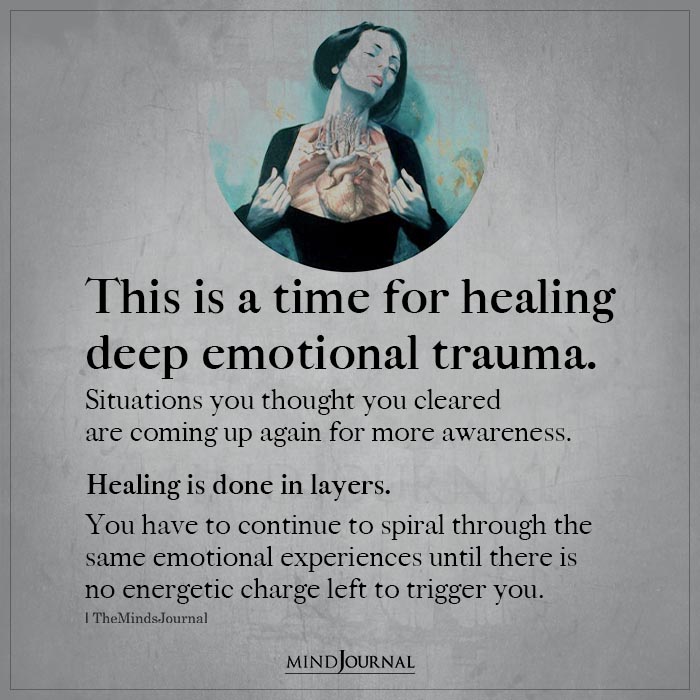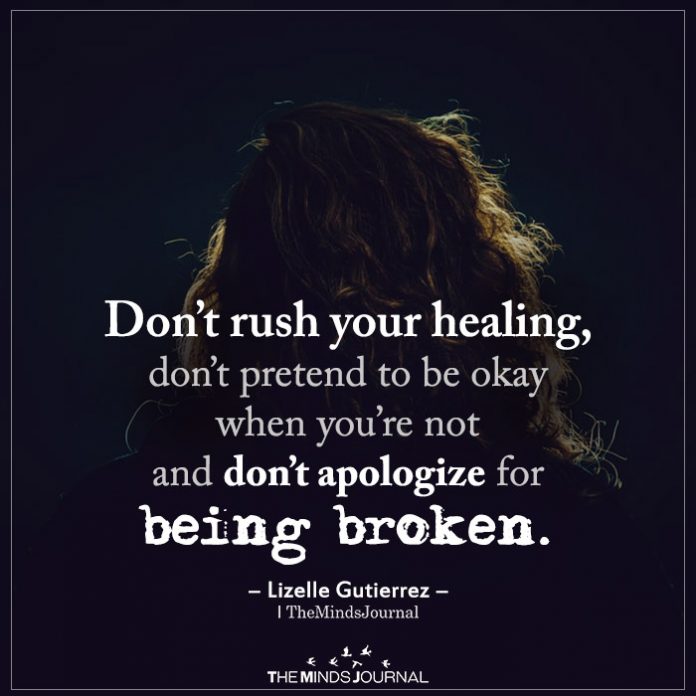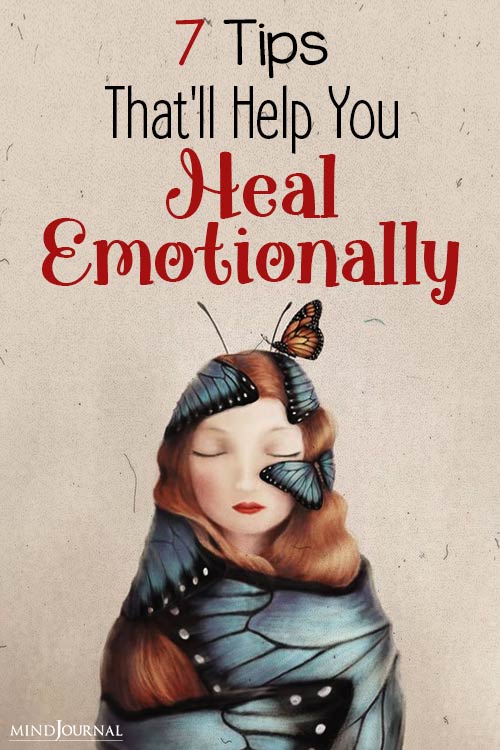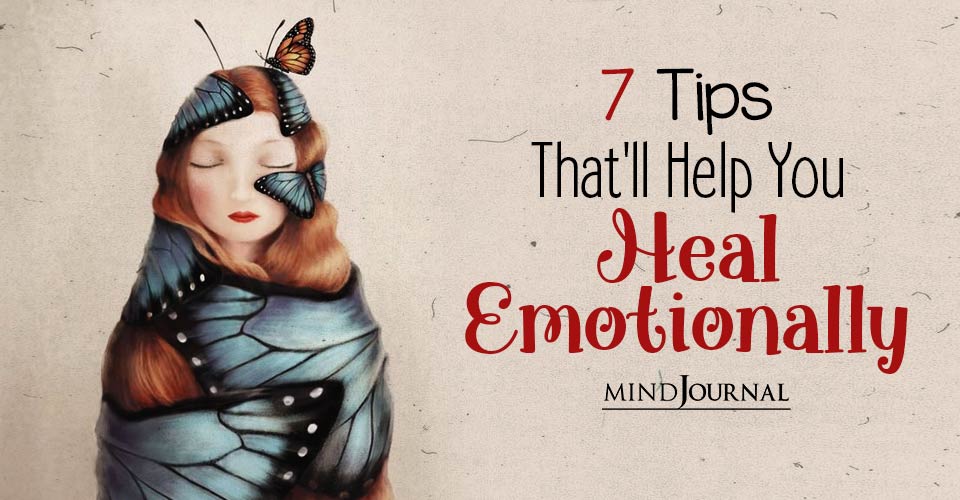When you go through something painful in life, be it a breakup, childhood trauma or neglect, losing a loved one, or even losing a job, suffering emotional wounds is a given. However, there comes a point when you need to let go of all that pain and suffering, and focus on how you can heal emotionally.
Healing emotional wounds is not an easy or smooth journey in any way, but probably necessary for living a happy and peaceful life. The thing about pain is that it always has something to teach you (but that doesn’t mean everyone has to suffer or that inflicting pain on others is justified!). The very first lesson of emotional and mental healing is learning to transform your pain into strength and wisdom because it is only then that you will be able to heal emotionally.
So, what are the ways to heal emotionally? Let’s find out!
Related: 7 Signs You Need Emotional Healing
7 Things That Can Help You Heal Emotionally
1. Be patient and don’t be too hard on yourself.
When it comes to healing emotional wounds, nothing happens overnight; you need to be patient and give yourself time to deal with everything. This doesn’t make you weak, rather it makes you smart enough to understand that moving on from pain and suffering is a long process, but definitely a worthwhile one.
Healing is a lot of work, and it’s important that you give yourself that time to understand what it’s trying to teach you. Even when things seem particularly challenging, try not to give up on yourself. Always remember that it’s a process and if you want to heal emotionally, you have to experience the ugly parts of the process too to truly move on.
2. Focus on self-compassion and self-love.
The process of emotional healing can demand a lot from you, and the journey is not always an easy one. That’s why it’s important to show yourself some much-needed self-compassion, self-love, and self-care. When you are trying to heal emotionally, it can take a lot out of you, and in a situation like this, it’s crucial that you treat yourself with a lot of patience and kindness.
In your journey to emotionally heal yourself, you need to pay attention to your body especially, and understand what it’s trying to tell you. Take care of yourself, and take it one step at a time.

3. Have realistic expectations.
No one like to suffer or be in pain for long, which is why many people try to fast-track the healing process. But this never yields good results. If you imagine that you will be able to overcome everything you have been through in just a few days or weeks, then you are setting yourself up for more disappointment.
Progress takes time and setting realistic expectations when it comes to emotional healing will only serve you better in the long run. Your progress might look like three steps forward and one step backward, but always remember, that that’s okay. When this happens, don’t think that you are failing; you are moving forward AND you are also learning to deal with obstacles too.
Related: 10 Signs Of Emotional Numbness and Ways To Recover
4. Gradually, learn to take responsibility for your life.
When you are hurt and in pain, it’s very natural to expect someone else to come and comfort you, protect you and save you. And honestly, until a point, that’s okay. It’s normal to rely on your close ones when you are suffering or are in pain, but when you stop taking control of your life, and other people start to make your decisions for you, that’s something to be concerned about.
One of the most important things you need to do if you want to heal emotionally is to take responsibility for yourself and your life. When you hit rock bottom, that’s when you realize that only you know what is best for you, and what you need to do to make sure you get out of the rut. When you finally realize that, you start taking your life seriously, and slowly work towards getting out of your misery and living a life you truly deserve.
5. It’s important to embrace what you feel.
As one of my good friends always says: “You’ve gotta feel it to heal it” (cheesy, yes, accurate, also yes). The thing about pain is that the more you try to run from it, the harder it will be to deal with in the long run. Running away from the pain or trying to avoid it is only going to delay your healing and at the same time, hurt more in the future.
Suppressed feelings can lead to emotional turmoil, and if you keep on doing that, moving on from the pain will only become harder. So, one of the best things you can do to heal emotionally is to feel what is happening inside you without trying to avoid it. It will be really, really hard at the beginning, but with time, you will see that you are able to deal with your pain much better than the day before.

6. Know that not every day is going to be a good day, and that’s okay.
Just because you are having setbacks and not every day is turning out to be a good day, that doesn’t mean you are incapable of defeating your pain. Always remember that failures and setbacks are a part of the process, and without them, the learning curve is never going to happen.
Most of the time, the best and most important lessons of life are learned in difficult and challenging situations compared to happy and perfect ones. Accept that not every day is going to be a good day, and that’s completely okay. Challenge yourself, and learn to tackle every curveball that life throws at you, head-on. Healing is only possible when you are willing to accept the good with the bad.
Related: 6 Powerful Ways To Improve Your Emotional Health
7. Don’t hesitate to ask for help, if things feel overwhelming.
Even though many people tend to judge people who choose to seek therapy, don’t let that demotivate and scare you. There’s no shame in asking for help when it feels like you are not being able to handle the negative emotions by yourself, and it feels like the walls are closing in on you.
Seeking therapy and speaking to a professional can help you tremendously when it comes to dealing with negative feelings and emotions. When things get too much for you to handle, relying on qualified professionals doesn’t make you weak, rather it makes you a smart and strong person who knows what you need to do to get your life back on track.
So, these are all the things that can help you heal emotionally. Let us know your thoughts in the comments down below!
Want to know more about how to heal emotional wounds? Check this vide out below!












Leave a Reply